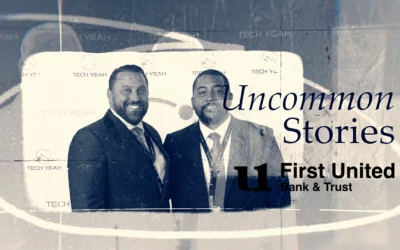Blog
Marissa Murphy to Spearhead Information Security and Disaster Recovery
Jason Rush, Senior Vice President and Chief Operating Officer at First United Bank & Trust, is pleased to announce the promotion of Marissa Murphy to Information Security and Disaster Recovery Officer. In this role, Marissa will be spearheading the corporation’s...
First United’s Phil Rodeheaver and Eric Goff receive CAFP designations
Jason Rush, Senior Vice President and Chief Operating Officer at First United Bank & Trust, is proud to announce that Phil Rodeheaver and Eric Goff recently passed the Certified Anti-Money Laundering and Fraud Professional exam and can now proudly display their...
Julia Hershman Promoted to Wealth Advisor
Chris Sisler, Director of Wealth Management Sales at First United Bank & Trust, is pleased to announce the promotion of Julia Hershman to Wealth Advisor. Bringing a background of relationship development, teamwork, and sales skills, Julia will focus on wealth and...
First United Promotes Laura Helmich
First United Promotes Laura Helmich to Director of Specialized Banking. Jason VanSickle, Managing Director of Financial Solutions, of First United Bank & Trust is pleased to announce that Laura Helmich has been appointed as Director of Specialized Banking. With...
Finture – Steps to Your Financial Future Launches
First United Bank & Trust is proud to announce the official launch of Finture – Steps to Your Financial Future, its enhanced financial education program, aiming to revolutionize financial literacy and support for local communities.
An Uncommon Story – Westwood Charm Boutique
Our Uncommon Stories Season 4 continues with Westwood Charm Boutique in Martinsburg, West Virginia. Thanks to the community’s support and some outside-the-box thinking, especially when it came to weathering the COVID-19 pandemic, the store demonstrates the importance, resilience, and strength found in local businesses.
Bulls & Bears Newsletter – Third Quarter 2024
Get the latest market insights with our Bulls & Bears Newsletter, provided by First United Bank & Trust Wealth Management Advisors.
First United Community Dreams Foundation Supports Landon’s Library
The First United Community Dreams Foundation is proud to provide $5,000 in funding to the WGW Community Youth Cup in support of Landon’s Library Trust Fund.
Jamie Alt appointed to Marketing Engagement Manager
Jennifer Petrie, the Director of Marketing & Communications, is thrilled to announce the appointment of Jamie Alt as the new Marketing Engagement Manager.
Jennifer Petrie takes the reins as Director of Marketing & Communications
Kimberly Moyers, Managing Director of Strategic Engagement, is excited to announce the promotion of Jennifer Petrie as the new Director of Marketing & Communications.
AJ Savopoulos promoted to Assistant IT Manager
AJ Tasker, Managing Director of Information Technology at First United Bank & Trust, is thrilled to announce that AJ Savopoulos has been appointed as the Assistant IT Manager. In this new role, AJ will manage daily IT applications, support initiatives to enhance customer value, and oversee the Bank’s infrastructure.
2024 First United Golf Tournament
First United Bank & Trust sponsored the 36th Annual Charity Golf Tournament at the Oakland Golf Club on Friday, July 12, 2024. This tournament has become a tradition and has raised over $700,000 for local charities. Participants enjoyed a challenging round of golf, and at the same time, raised needed funds to support numerous community projects. This year, the recipient of the tournament proceeds was the United Way of Garrett County, to which First United donated $ 47,500.
Amanda McKenzie takes the helm as our new Director of HR!
First United Bank & Trust is thrilled to announce the promotion of Amanda McKenzie to the position of Director of Human Resources. With 20 years of experience in both banking and human capital, Amanda brings a wealth of knowledge and expertise to her new role.
Introducing Meagan Ward – Our Newest Addition to the Morgantown Team!
Jason Rush, the Senior Vice President and Chief Operations Officer at First United Bank & Trust, is proud to introduce Meagan Ward as the newest member of the Company’s business and commercial banking division serving the greater Morgantown area.
Julie Peterson Appointed Chief Credit Officer at First United Bank & Trust
Carissa Rodeheaver, Chief Executive Officer, President, and Chairman of the Board for First United Bank & Trust is pleased to announce that Julie Peterson has been named as Chief Credit Officer.
An Uncommon Story – Trilogy Innovations
The fourth season begins by spotlighting Trilogy Innovations, a groundbreaking tech company located in West Virginia.
First United Bank & Trust’s AJ Tasker Earns PMP Certification
Chief Operations Officer, Jason Rush, shares news that AJ Tasker has earned his Project Management Professional (PMP) Certification.
Supporting Mylan Park with New Community Room
First United Bank & Trust is proud to announce its support of Mylan Park through the addition of the Community Room.
What Matters Most – Monthly Economic Update for November 2023 with Megan Kinsinger
Our monthly economic update report from the First United Wealth Management department. Megan Kinsinger, Portfolio Manager, joins us to discuss the negatives and positives happening in the market for November 2023.
First United Corporation elects Kevin Hessler to Board of Directors
The board of directors of First United Corporation has elected Kevin Hessler as its newest director, serving on Audit, Loan, and ALCO Committees.
Andrew Hardesty Awarded Top Honors
Andrew Hardesty, Commercial Relationship Manager, has successfully finished the Commercial Credit Training Course provided by Credit Training, Inc. Andrew not only achieved a rare 90+ designation on the final exam, but also attained the highest score in the May 2023 class.
What Matters Most – Navigating Beneficiary Updates with John Hetrick
Explore the essentials of beneficiary updates as John Hetrick demystifies the complexities, providing actionable insights for securing your financial legacy.
What Matters Most – Year End Planning with Kolby Abruzzino
In today’s episode of ‘What Matters Most,’ we’re joined by Kolby Abruzzino, CFP and Wealth Advisor at First United, to delve into the essential aspects of year-end financial planning, covering topics from cash flow and estate planning to insurance reviews and emergency funds.
What Matters Most – Monthly Economic Update for October 2023 with Brad Bolyard
Our monthly economic update report from the First United Wealth Management department. Brad Bolyard, Portfolio Manager, joins us to discuss the negatives and positives happening in the market for October 2023.
What Matters Most – Charitable Giving with Julia Hershman
In today’s episode of What Matters Most, we converse with Julia Hershman about the intricacies of charitable giving, exploring its many forms, benefits, and tax considerations, all against the backdrop of Wealth Management’s 60th anniversary.
An Uncommon Story – Fahrney Keedy
Our third season continues with a fascinating glimpse into the Fahrney Keedy Senior Living Community.
What Matters Most – Fraud Prevention with Eric Goff
Join fraud expert Eric Goff in this episode of ‘What Matters Most’ as he unravels the intricate web of fraud schemes and offers actionable steps for robust fraud prevention.
What Matters Most – Monthly Economic Update for September 2023 with Sean McCreery
Our monthly economic update report from the First United Wealth Management department. Sean McCreery, Vice President & Wealth Investment Officer, joins us to discuss the negatives and positives happening in the market for September 2023.
First United Bank & Trust Recognizes Retiring Teacher
First United Bank and Trust recently recognized Mrs. Athena Wilson for being a participating teacher in the Stock Market Game competition for the last 29 ½ years. During her career, she supervised student teams in 59 Stock Market Game competitions, which involved over 1,200 of her students.
Bulls & Bears Newsletter – Third Quarter 2023
Get the latest market insights with our Bulls & Bears Newsletter, provided by First United Bank & Trust Wealth Management Advisors.
What Matters Most – Navigating Employee Benefit Plans with Brandi Helman
In this insightful episode of ‘What Matters Most’, we talk with Brandi Helman, Wealth Advisor at First United’s Wealth Management Department, and delve into the nuances of Employee Benefit Plans (EBPs). They discuss the critical role of EBPs for both employees and employers, how to leverage these benefits, and the importance of EBPs in fostering a committed and stable workforce.
What Matters Most – Monthly Economic Update for August 2023 with Megan Kinsinger
Our monthly economic update report from the First United Wealth Management department. Megan Kinsinger, Portfolio Manager, joins us to discuss the negatives and positives happening in the market for August 2023.
What Matters Most – Empowering Our Community with Phyllis York of ECLN
In this episode, we talk with Phyllis York, the Founder and Executive Director of the Empowering Community Leaders Network (ECLN), about their transformative mentoring program for girls. Discover how ECLN is building leadership capacity, fostering self-confidence, and promoting community engagement, and learn how you can get involved. For more information, visit their website at eclninc.org.
First United Bank & Trust Among Top Community Banks
First United Bank and Trust has been ranked 49th in the 2023 Top 200 Community Banks listing by American Banker. Each year, American Banker publishes the list of the top 200 performing publicly traded banks with under $2 billion in assets.
What Matters Most – Tax Updates & Updates with Shane Small
In this episode, we welcome Shane Small, VP & Senior Wealth Advisor at First United Bank & Trust, for a timely discussion on tax updates from the Wealth Management area. As the mid-year approaches, it’s crucial to review your taxes and ensure you’re on the right track. Shane shares valuable insights on changes in retirement accounts, including Required Minimum Distributions (RMDs), as well as capital gains requirements. Moreover, he highlights the importance of retirement planning and how individuals can effectively manage their income and tax burdens. Tune in to gain practical advice and expert tips to optimize your financial well-being.
What Matters Most – Monthly Economic Update for July 2023 with Brad Bolyard
Our monthly economic update report from the First United Wealth Management department. Brad Bolyard, Portfolio Manager, joins us to discuss the negatives and positives happening in the market for July 2023.
What Matters Most – Annual Charity Golf Tournament Discussion with Michele Walker
We’re joined today by Executive Director at County United Way, Michele Walker, to discuss County United Way and the 35th Annual Golf Tournament presented by First United! Listen to learn more about United Way, and the upcoming tournament to see how you can get involved!
What Matters Most – Monthly Economic Update for June 2023 with Sean McCreery
Our monthly economic update report from the First United Wealth Management department. Sean McCreery, Vice President & Wealth Investment Officer, joins us to discuss the negatives and positives happening in the market for June 2023.
First United Bank & Trust Names Laura Helmich Director of Consumer Services
Jason VanSickle, Managing Director of Consumer Services, of First United Bank & Trust is pleased to announce that Laura Helmich has been appointed as the Director of Consumer Services.
An Uncommon Story – Perineologic
Season 3 of our series kicks-off with Matt & Kelli Allaway from Perineologic. Their Uncommon Story is an emotional journey from patient to patent.
Bulls & Bears Newsletter – First Quarter 2023
The latest Bulls & Bears Newsletter from our Wealth Management advisors can provide you the latest insights into the market, trends and impacts. Download and print right from our website.
What Matters Most – More Mortgage Options with Becky Crowell & Jim Stemple
Join us as we welcome Mortgage Relationship Managers Becky Crowell and Jim Stemple, who will discuss the merger between First United and First Mortgage Services, highlighting the benefits for the organization and its customers. Discover how this merger enhances First United’s services, providing more mortgage options and leveraging the team’s extensive experience in this must-listen episode for anyone interested in mortgages.
What Matters Most – Monthly Economic Update for May 2023 with Megan Kinsinger
Our monthly economic update report from the First United Wealth Management department. Megan Kinsinger, Portfolio Manager, joins us to discuss the negatives and positives happening in the market for May 2023.
What Matters Most – Estate Planning with Annette Chapman
Join us on our latest podcast as we sit down with Annette Chapman, VP and Senior Wealth Advisor in First United’s Wealth Management Department. Annette will be sharing her valuable insights on estate planning, discussing what it is, who should consider it, and the key documents that make up a sound estate plan. Whether you’re new to estate planning or looking for ways to improve your existing plan, Annette’s expertise will provide you with the knowledge and tools you need. Estate planning is a critical component of any sound financial strategy, and this podcast is an essential listen for anyone looking to safeguard their assets and provide for their loved ones. Tune in now and discover the importance of estate planning.
What Matters Most – Discussion on County United Way with Michele Walker
We’re joined today by Executive Director at County United Way, Michele Walker, to discuss United Way and all the great things they are doing in the community as part of their annual campaign. Listen to learn more about United Way. You can also visit https://cuw.org to learn how you can help!
What Matters Most – Monthly Economic Update for April 2023 with Brad Bolyard
Our monthly economic update report from the First United Wealth Management department. Brad Bolyard, Portfolio Manager, joins us to discuss the negatives and positives happening in the market for April 2023.
What Matters Most – Monthly Economic Update for March 2023 with Sean McCreery
Our monthly economic update report from the First United Wealth Management department. Sean McCreery, Vice President & Wealth Investment Officer, joins us to discuss the negatives and positives happening in the market for March 2023.
What Matters Most – MBA 2023 Food Drive
Today we are joined by Blake Walker, VP and Director of Commercial Services at First United Bank & Trust, and Dana Jung, 1st VP and Director of Business Resiliency at Eagle Bank, to discuss the MBA 2023 Emerging Leaders Champion Program and their philanthropic effort to assist Maryland and West Virginia Food Banks with a year long food drive.
What Matters Most – Wealth Management Anniversary
Today we talk with Chris Sisler, Vice President and Senior Wealth Advisor in First United’s Wealth Management department about her role, the role of Wealth Advisors at First United, and why 2023 is a special year for the Wealth Management department at the bank.
What Matters Most – Monthly Economic Update for February 2023 with Megan Kinsinger
Our monthly economic update report from the First United Wealth Management department. Megan Kinsinger, Portfolio Manager, joins us to discuss the negatives and positives happening in the market for February 2023.

























